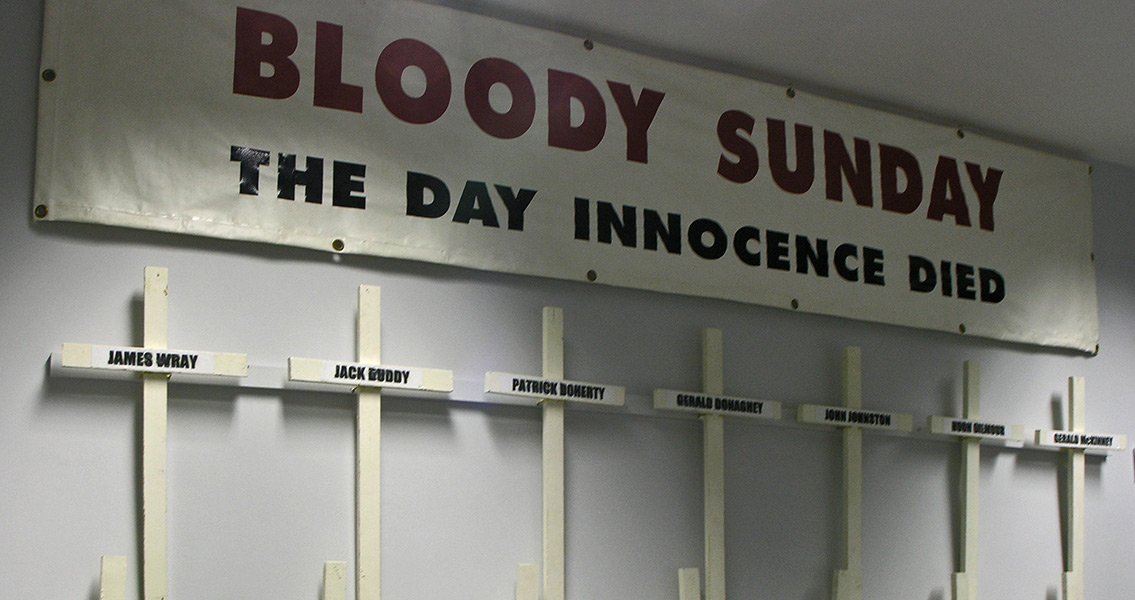<![CDATA[A civil rights march on 30th January, 1972, ended in a massacre when British soldiers opened fire on protesters, in what has come to be known as the Bloody Sunday Massacre. Ten thousand people gathered in the Creggan area of Derry, Northern Ireland, on the morning of 30th January, 1972, for a march organised by the Northern Irish Civil Rights Association (NICRA). They'd planned a peaceful march to protest the British policy of internment which saw suspected members of Irish Nationalist paramilitary organisations held by the British forces without trial. At around 3pm the march set off from the Creggan housing estate and headed towards William Street. The British Army had sealed off the planned route of the march, and the NICRA organisers instead led the marchers to 'Free Derry Corner' - a self declared independent area in the nationalist district of Bogside. Another smaller group of protesters decided to defy the British army, and continued towards the barricade. Skirmishes broke out between the protesters and the authorities, the protesters hurling stones and other missiles, the British soldiers using CS Gas, water cannons and rubber bullets. When the riot started to dissipate, and the protesters began to disperse, soldiers from the 1st British Parachute Regiment moved in to make arrests. Tragedy followed. Over the next few minutes the paratroopers opened fire into the crowd. Thirteen men aged between 17 and 41 were killed - John Duddy, Michael Kelly, Hugh Gilmour, William Nash, John Young, Michael McDaid, Kevin McElhinney, James Wray, William McKinney, Gerard McKinney, Gerard Donaghy, Patrick Doherty and Bernard McGuigan. On 16th June, 1972, a fourteenth victim, John Johnston, died as a result of injuries attributed to the Bloody Sunday shootings. In addition to the fatalities, seventeen protesters were wounded. The civil rights march attempted on 30th January, 1972, was a symptom of prolonged outrage at the presence of British troops in Northern Ireland. The short term trigger came in August 1969, when British soldiers were deployed to Derry as a peacekeeping force. The British authorities' internment policy, combined with accusations that they were rigging electoral wards to favour Protestant voters, led to a growing civil rights movement. Bloody Sunday brought international attention to the crisis in Northern Ireland. Protests erupted across both Northern Ireland and the Republic of Ireland, culminating in outraged Irish citizens burning the British embassy in Dublin in February 1972. For the cause of Irish nationalism, the event was shown as another strain of centuries of British oppression. "If you stay British soldiers, if you stay You'll never ever beat the IRA For the 14 men in Derry Are the last that you will bury So take a tip, and leave us bloody be" The Wolfe Tones – Go On Home British Soldiers Its depiction in Irish rebel songs such as ‘Go On Home British Soldiers’ shows that for many in Ireland the massacre was just another tragedy in a centuries old conflict between British imperialism and Irish nationalism. The Bloody Sunday massacre was absorbed into the tradition of rebel music which had for centuries railed against British interference in Ireland and Northern Ireland. It took decades for the British government to accept the responsibility of its military for the massacre. A controversial report, headed by High Court Justice Lord Widgery, was published in summer 1972. It exonerated the British troops, and suggested that the protesters had been carrying explosives and other weapons. It wasn’t until 2010 that a new report into the events was published, headed by Lord Savile it laid responsibility for the massacre with the British army and cleared all of the victims of any wrong doing. Among other crucial conclusions, it claimed the soldiers opened fire without warning and subsequently attempted to cover up their actions, and that the protesters were all unarmed. In November 2015 a former British soldier was arrested for questioning in regards to the shootings, showing that 44 years on, the Bloody Sunday massacre is yet to be truly resolved. Image courtesy of Wikimedia Commons user: SeanMack ]]>
Bloody Sunday – British Troops Shoot Unarmed Protesters
